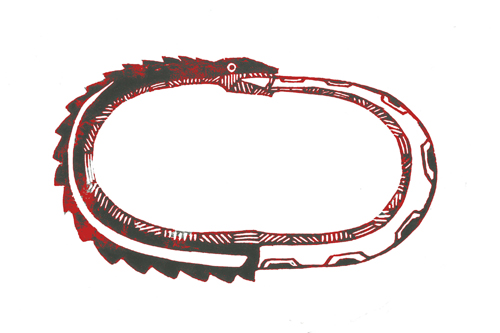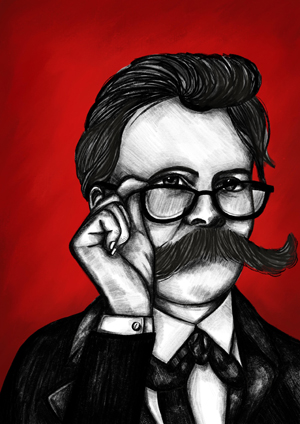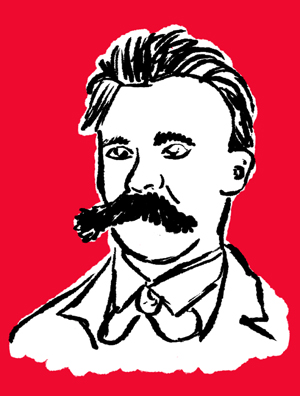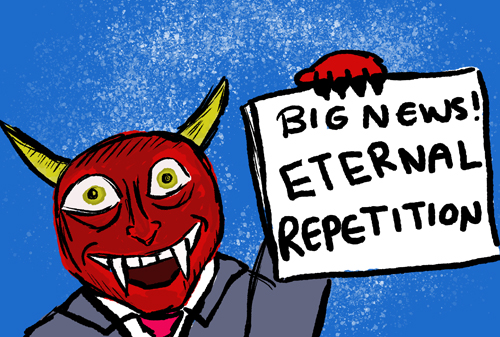
Your complimentary articles
You’ve read one of your four complimentary articles for this month.
You can read four articles free per month. To have complete access to the thousands of philosophy articles on this site, please
Nietzsche Past & Future
Eternal Recurrence Revisited
Brandon Robshaw looks again at Nietzsche’s idea of the eternal repetition of life.
I read Friedrich Nietzsche with a mixture of admiration, amusement, outrage, and exasperation. His philosophy is the antithesis of the kind of philosophy I usually like to read and to do (that is to say, analytic philosophy), and I cannot read him for very long at a stretch. It’s like listening to a man talking at the top of his voice all the time, and it becomes wearisome. But his writing is extremely rich, stimulating, and crammed with ideas.
One particular idea of his has always intrigued me: the idea of eternal recurrence (or eternal return, as it is also known). It is a bizarre, fanciful, poetic idea, and it occurred to me that applying the methods of analytic philosophy to it might be a fruitful marriage between the analytic and the so-called Continental traditions.

Ouroboros © Georgia Haines 2020
Infinite Reflections
First, let’s look more closely at the idea. It’s mentioned a number of times in Nietzsche’s works. It crops up in Thus Spoke Zarathustra (1883-5), for example, where Zarathustra repeats seven times this incantation: “Oh, how should I not lust for eternity and for the wedding ring of rings – the Ring of Recurrence! Never yet did I find the woman by whom I wanted children, unless it be this woman, whom I love: for I love you, O Eternity! For I love you, O Eternity!” However, the idea is not fully examined or explored there: instead one is supposed to ponder its implications for oneself.
The fullest treatment of eternal recurrence appears in The Joyous [Gay] Science (1882):
“What, if some day or night a demon were to steal after you into your loneliest loneliness and say to you: ‘This life as you now live it and have lived it, you will have to live once more and innumerable times more; and there will be nothing new in it, but every pain and every joy and every thought and sigh and everything unutterably small or great in your life will have to return to you, all in the same succession and sequence – and likewise this spider and this moonlight between the trees, and likewise this moment and I myself. The eternal hourglass of existence will be turned over again and again, and you with it, you speck of dust!’
Would you not throw yourself down and gnash your teeth and curse the demon who spoke thus? Or have you once experienced a tremendous moment when you would have answered him: ‘You are a god and never have I heard anything more divine.’”
Nietzsche did not invent the idea of eternal recurrence. The notion that life is cyclical, that death is followed by rebirth ad infinitum, was entertained in the ancient world not only by Eastern philosophers but also by Greek thinkers such as Empedocles and the Stoics, as Nietzsche would certainly have known. But there are two key differences in Nietzsche’s presentation of the idea. In the first place, he posited that each recurrence of history would be identical in every respect, down to the tiniest details. Your life can never change. So Nietzsche himself, who in many ways had an unhappy life, full of suffering, would have to go through the death of his father and brother when he was a small child, his chronic ill-health, chest pains, migraines, and insomnia, his unrequited love, his visual impairment, his poverty and lack of recognition, and eventually his descent into madness, over and over again for eternity. In the second place, in his published works Nietzsche did not advance the theory as a factual claim, about how things really were. However, according to Kevin Hill, an editor and translator of The Joyous Science, entries in Nietzsche’s private notebooks suggest that he did believe it to be true – on what evidence it’s hard to say. As a claim it would be impossible to test by scientific means, since one would have to get outside time to make the necessary observations. But we do not have to follow the Nietzsche of the notebooks. We can more profitably think of eternal recurrence as a thought experiment to determine how one would react if one believed it to be true. This is precisely how he presents the idea in The Joyous Science.

Friedrich Nietzsche by Emalee Wickham 2020
The point of the thought experiment is a sort of test of one’s relationship with one’s life. Do you celebrate being alive; do you savour every moment, even the most painful or challenging ones? If so the demon’s words will be wonderful news: you will be able to savour it all over, again and again, forever and ever and ever. If, on the other hand, your response is to feel absolutely horrified, that strongly suggests that you are not making the most of your time here.
Nietzsche offers only these two alternatives: horror or delight. It is clear that he recommends the delighted reaction. This ties in with his idea of amor fati, love of one’s fate. In Section 276 of The Joyous Science he puts it thus: “I want to come to regard everything necessary as beautiful – so that I will become one of those who makes everything beautiful. Amor fati: from now on, let that be my love!” But there are other possible responses. A third response which Nietzsche did not consider would be to feel neither elated nor horrified at the idea, but indifferent. After all, however many times one lives this life, each time always feels like the first and only time. No memories are carried over from one incarnation to the next, so what difference would it make, anyway?
Well (assuming that you believed the demon), it could make just this difference: you would know for the rest of your life that everything that happened would happen again. This might change the way you regarded each of your experiences, from toothaches to relationships, walks to washing dishes. It therefore seems to make a difference exactly when the demon appears to you bearing the news of your eternal repetition. If it appeared on your deathbed, then it could occasion only a moment of elation or horror and the whole of your life preceding that point would be unaffected; whereas if it appeared when you were a child, it would colour your attitude to experiences for the rest of your days.

Friedrich Nietzsche again by Charlotte Rudge 2020
Let’s imagine that the demon appears to you tonight with the news of your eternal repetition. First, how would this colour your attitude to the past? The pre-demon years cannot be changed, of course; but the knowledge that one would have to live them over and again, unchangingly, for eternity, would surely change the way you regard them. I would suggest that painful memories would become more painful. Nietzsche seems to recommend an attitude of acceptance towards suffering, which is, in its way, quite attractive. What I personally would find harder to accept is my own stupid mistakes – the silly, embarrassing, and sometimes shoddy or ignoble things I’ve done and said. Philip Larkin once remarked that he had about twelve memories that made him want to clutch his head and howl aloud – and that’s just reliving them in memory. It would be far worse (infinitely worse?) if one knew one had to actually do them all over again, and again. I think it would arouse in me a sort of desperate compassion for my benighted younger self; but a futile compassion – one that could never touch or reach its object. On the other hand, there are lots of moments in most people’s lives that it would be wonderful to relive: memories of families and friendships and first loves, of holidays and parties, your first taste of ice cream, your first kiss, the first time you discovered a favourite author or artist or musician… It would be very nice indeed to think of those coming round again. So I think the result would be an intensification of all one’s feelings, both good and bad, about the past.
Intensification also applies going forward. You would be conscious that every experience is a permanent possession. This no doubt would make you attend to your experiences more, and live a more vivid life. But there is a crucial difference between pre-demon life and post-demon life. In post-demon life, you can modify your attitudes, your choices and your behaviour. You might consciously try to construct a life which from now on would be worth the reliving. In this sense, then, eternal recurrence could be a marvellously positive, optimistic doctrine – though perhaps not quite in the way Nietzsche intended. Nietzsche wanted to be able to love his fate whatever it was, but the idea here is rather to choose a fate that’s worth loving.
It might be objected here that any notion of choice has to be an illusion. Since the future is already mapped out – I have lived it an infinite number of times before, and it is always identical – then my actions and attitudes will be what my actions and attitudes have always been. My future would be predetermined. But this need not make one fatalistic. There is a distinction between determinism and fatalism. With determinism, whatever I do is caused, and as long as the causes remain unchanged I could never have done otherwise than what I actually do. However, this doesn’t mean that I’m being controlled. It does not mean that I have no agency. My own aims and volitions are themselves part of the causal factors of my attitudes, choices and behaviour. The idea of fatalism, however, is that I am a helpless plaything of the Fates, and I don’t really have any agency at all. Even if I went off-script (assuming that were possible), the Fates would see to it that the ultimate outcome for me remained the same.
It seems to me that the deterministic interpretation works better here. It is not conscious Fates that are shaping my future, but the unchanging laws of the universe. And armed with the knowledge the demon has brought me, I can – which is to say, must – make decisions about how I want my life to go (just as I always have done anyway), and make sure it’s a life worth reliving, and one that I can love. Here one can perform a sort of mental trick and think, ‘The idea of eternal recurrence got me to this point, but I don’t need it any more. Let’s say it’s not true (and actually, why would it be?); it still makes sense to choose a fate that’s worth loving, even if it only happens the once.’

Demon News © Charlotte Rudge 2020
Time Heals & Wounds
If we could stop there that would seem quite a satisfactory outcome. But here’s a thought which seems to go against the approach I’ve just outlined.
Let’s entertain the notion that eternal recurrence is true for another moment. There’s an important consequence of its truth which Nietzsche does not explore, but which seems to overturn my previous interpretation. The way that we experience time forms and conditions our understanding of life: all our values, our aims, the way we perceive and experience joy and suffering, ideas of earning, learning, building, progress, sacrifice, improvement and deterioration, achievement, and loss, all depend on a forward-flowing concept of time, in which the present or the future can justify or redeem the past. A story of rags-to-riches is a happy story, even if the ratio of rags to riches is exactly equal at 50% each; while a story of riches-to-rags is a tragic one, even though the proportions are identical. But this normal framework for experiencing, understanding, and appreciating the sequenced events of a life becomes nonsensical when life is not linear and limited but cyclical and eternal. Then there is no such thing as a rags-to-riches story; rather, a rags-to-riches-to-rags-to-riches-to-rags-to-riches etc etc story for eternity. There is no longer any before or after. On eternal recurrence, losing something entails finding it again; death entails birth; bereavement entails resurrection; experience entails innocence. If we really took eternal recurrence on board, would we be able to make any sense of life at all – would we have any values? Would one thing be better than another?
So I am caught in a dilemma: Is eternal recurrence an idea which gives me good reason to make the rest of my life a fate worth living, and loving, or does it simply render everything meaningless?
© Brandon Robshaw 2020
Brandon Robshaw lectures in philosophy for the Open University. His book Should a Liberal State Ban the Burqa? will be published by Bloomsbury in June. He also has a philosophical novel for Young Adults, The Infinite Powers of Adam Gowers (Unbound, 2018).









